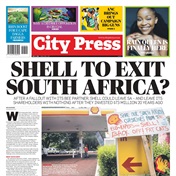
He was a fellow countryman, someone I confided in during tough times, but to the rest of the world, he is now remembered as the ‘burning man’, synonymous for his final posture — on his hands and knees, his flesh on fire as he begged for his life.
These were the evocative words of Francisco Rovissene as he recalled the 2008 xenophobic attacks that gripped South Africa.
The attack he was referring to occurred in Reiger Park in the East Rand and claimed the life of his “fellow countryman”, Ernesto Alfabeto Nhamuave, ten years ago today.
Rovissene was among hundreds of foreign nationals who took part in a remembrance service in Yeoville on Friday, hosted by African Diaspora Forum to honour those who lost their lives in the 2008 xenophobic violence.
“It’s been ten years since the attacks, yet the wounds are still fresh. I do not talk of literal wounds, but more of the emotional turmoil that still consumes most survivors.
“I was also cornered, beat up and only survived because two elderly women intervened and risked their own lives. Since that day in 2008, I have never set foot in that township,” said Rovissene.
The asylum seeker from Mozambique explained that due to the 2008 xenophobic attacks, he had to leave everything he owned and start over.
“I suffer from panic attacks, and for a long time I drowned myself in alcohol as I tried to escape reality. I pushed away family and friends but what I am most ashamed of is that to this day I still haven’t gone to pay my respects to Nhamuave’s family,” said an emotional Rovissene.
Rovissene acknowledged that he was not a close friend of the late Nhamuave, but had interacted with him and his brother-in-law, Francisco Kanze, who survived the attack that led to Nhamuave’s tragic death, on a number of occasions.
African Diaspora Forum chairman Marc Gbaffou said that he was disappointed that some government officials still harboured xenophobic tendencies.
“It is a pity that even as we commemorate the tragic loss of life during the 2008 xenophobic attacks, there are still people within the South African government who encourage such acts and disunity among Africans.
Mashaba angers African diaspora
“One such person is Johannesburg mayor, Herman Mashaba, as well as the North West premier [Supra Mahumaphelo] who publicly encouraged the chasing away of people of other nationalities.”
Mashaba caused an uproar during a panel discussion at the Mo Ibrahim Foundation’s governance conference in Kigali, Rwanda, last week when he declared “war” against illegal foreign nationals.
During the panel discussion, Ethiopia-based Kenyan researcher, Michelle Mendi Muita from the Institute for Peace and Security Studies, asked Mashaba if there was a “disconnect between genuine local sentiments (a fear of being overwhelmed by illegal immigrants) and aspirations for free travel and trade in Africa.”
Her question was motivated by the fact that South Africa had not signed the Africa Free Trade Agreement.
In his response, Mashaba launched into an attack on illegal immigrants saying: “Anyone who’s been in the city illegally must be prepared to face us. We are not going to tolerate illegality in our city… I’m actually declaring war against illegality in our city.
“We’ve got the most porous borders in the world. Because of our open, porous borders, criminal syndicates are coming into our country to destroy our communities,” Mashaba said.
Gbaffou said such statements were the reason why South African residents “always turned to attacking the most vulnerable, foreign nationals even when they are protesting against unrelated issues such as government’s inability to provide decent service delivery.”
Diaspora ready to help build social cohesion
Gbaffou explained that the African Diaspora Forum was ready to work with government to foster social cohesion.
“It is a pity, particularly when one remembers that South Africa itself went through a significantly tough time during Apartheid, but managed to overcome with the assistance of other African nations. Now we have to meet to remember how foreign nationals met their end ten years ago at the hands of South Africans,” said Gbaffou.
Gbaffou said his organisation sought to encourage foreign nationals to employ local South Africans when they start businesses, and equally to encourage South Africans to utilise foreign nationals already residing in the country and their first point of contact when seeking to expand their business opportunities into the rest of Africa.
“If such cohesion does not exist we will unfortunately continue to see violence against foreign nationals. Since 2008 we have seen change, unfortunately for the worst, as political heads continue to encourage intolerance,” said Gbaffou.




 Publications
Publications
 Partners
Partners








